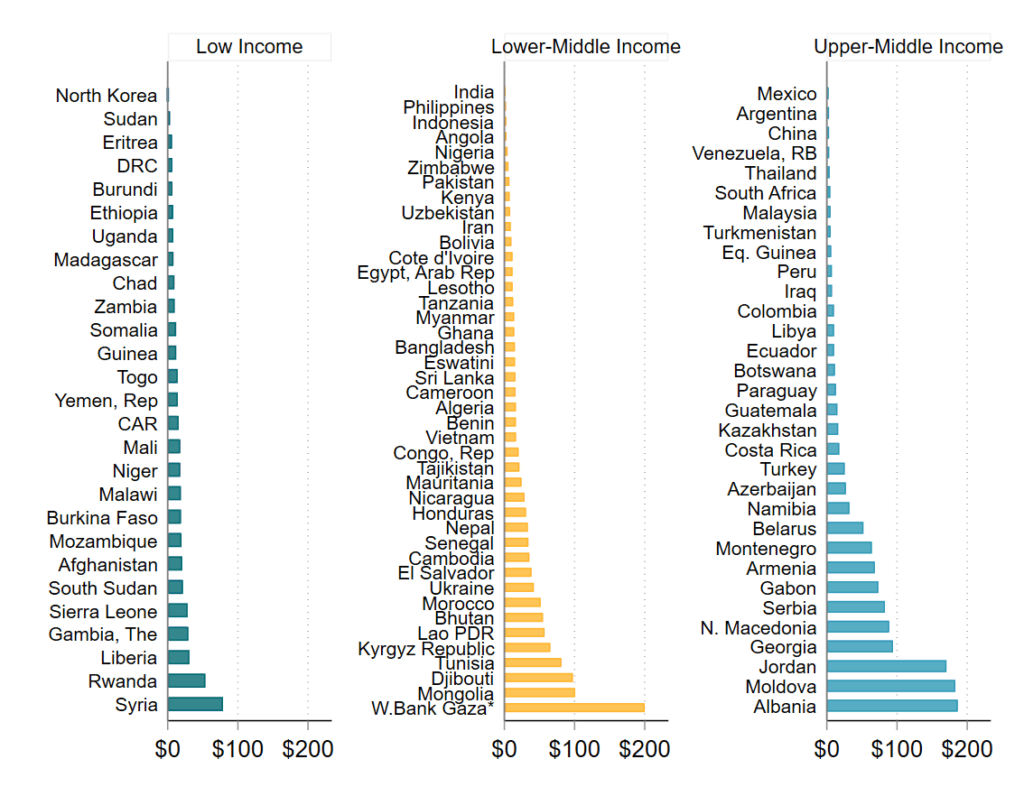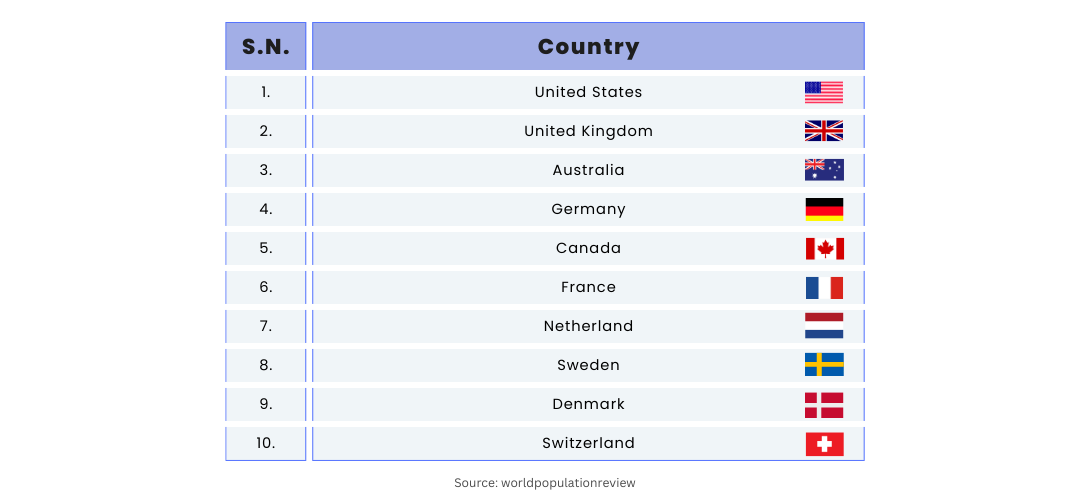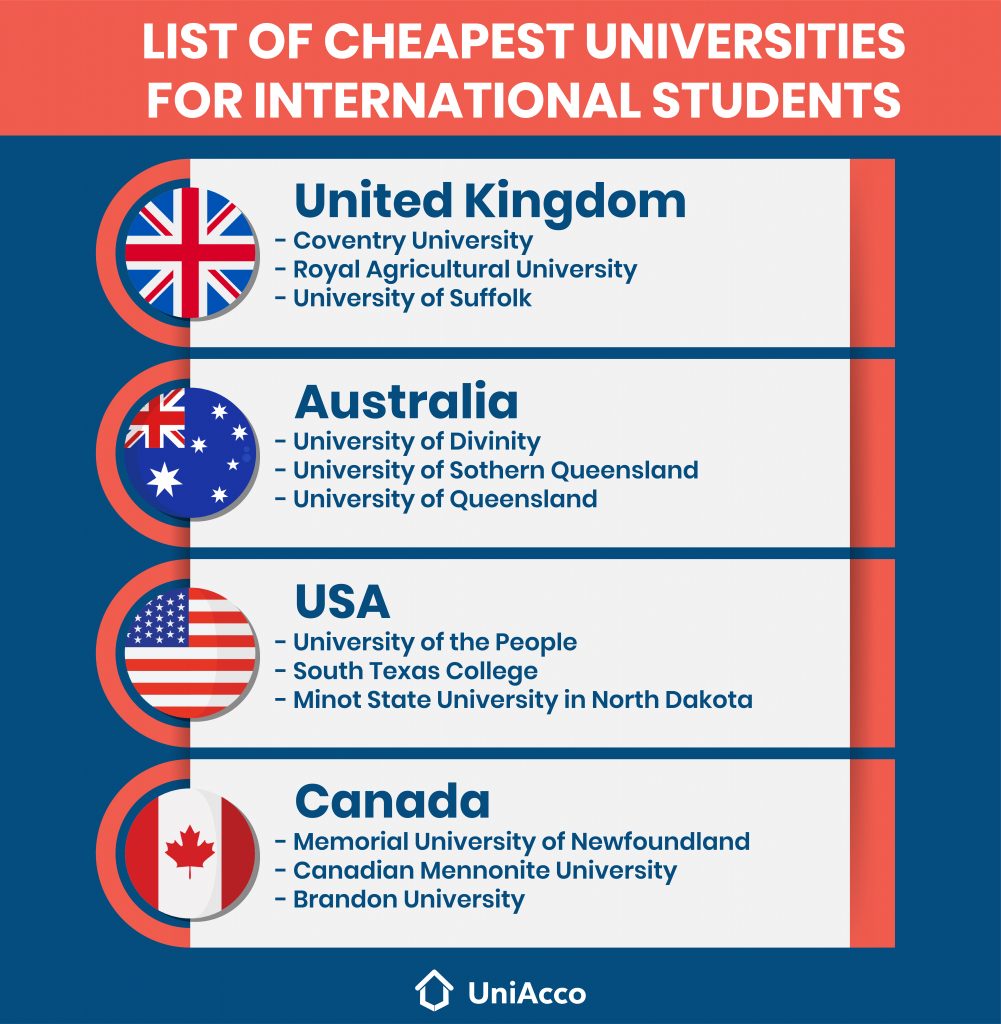Top Countries Offering Education Funding for Foreigners

In an increasingly interconnected world, pursuing education abroad has become a coveted aspiration for many. However, the financial burden can be a significant deterrent. Fortunately, numerous countries recognize the value of international students and offer various funding opportunities to support their academic endeavors. This article unveils the top countries renowned for providing generous education funding for foreigners, encompassing scholarships, grants, fellowships, and other financial aid programs. Aspiring international students can discover pathways to pursue their educational dreams by understanding these countries' commitment to fostering global talent and academic exchange. Discover opportunities to achieve academic excellence.
Top Countries Offering Education Funding for Foreigners
The pursuit of higher education abroad is a significant investment, and many talented individuals require financial assistance to achieve their academic goals. Fortunately, several countries are committed to attracting international students by offering diverse funding opportunities. These opportunities can range from fully funded scholarships covering tuition, accommodation, and living expenses, to partial scholarships, grants, and loans. The availability and specific details of these programs vary depending on the country, institution, and field of study, but the common goal is to foster global collaboration and exchange of knowledge by supporting international students in their educational endeavors. Therefore, prospective students should thoroughly research the funding options available in their desired countries to make informed decisions about their educational journeys.
Germany: A Hub for Research and Innovation
Germany stands out as a leading destination for international students, particularly in fields like engineering, sciences, and humanities. The German Academic Exchange Service (DAAD) is a primary source of funding, offering a wide array of scholarships for various academic levels and disciplines. These scholarships often cover tuition fees, living expenses, and health insurance. Furthermore, many German universities offer tuition-free education to both domestic and international students, though a semester contribution is usually required to cover administrative costs. Beyond DAAD scholarships, individual universities and research institutions also provide funding opportunities, making Germany an attractive and affordable option for pursuing higher education.
The United States: Diverse Funding Avenues
The United States attracts a large number of international students, offering diverse funding avenues beyond just scholarships. While competitive scholarships are available from universities, foundations, and government agencies, students often explore assistantships (teaching or research) that provide stipends and tuition waivers. Many US universities also offer need-based financial aid to international students, though the eligibility criteria and availability can vary widely. Furthermore, private loans are an option for some students, though they typically require a co-signer who is a US citizen or permanent resident. The US system requires diligent research to navigate the various funding possibilities and requirements.
Australia: Government and University Scholarships
Australia offers a range of scholarships for international students, primarily through the Australian Government's Research Training Program (RTP) and individual universities. The RTP provides funding to support research degrees, covering tuition fees and providing a living allowance. Many Australian universities also offer their own scholarships, based on academic merit, field of study, and other criteria. Additionally, some professional organizations and private institutions provide scholarships for specific fields of study. It's important to note that Australian scholarships are often highly competitive, requiring excellent academic records and strong research proposals.
Canada: Provincial and Institutional Support
Canada offers a mix of federal, provincial, and institutional scholarships for international students. The Canadian government provides some scholarships, such as the Vanier Canada Graduate Scholarships for doctoral students, but the majority of funding comes from individual provinces and universities. Many Canadian universities offer scholarships based on academic excellence, research potential, and financial need. Provincial governments may also offer scholarships or grants for students pursuing specific fields of study or attending institutions within their jurisdiction. Securing funding often involves contacting specific universities and provincial ministries of education directly.
The Netherlands: International Study Grants and Scholarships
The Netherlands offers a range of scholarships and grants aimed at attracting talented international students. The Netherlands Fellowship Programmes (NFP) are particularly noteworthy, providing scholarships for professionals from developing countries to pursue master's degrees and short courses. Dutch universities also offer their own scholarships, often based on academic merit and specific program requirements. Additionally, some private foundations and organizations provide funding for international students studying in the Netherlands. The relatively lower tuition fees compared to other Western countries make the Netherlands an attractive and cost-effective option for higher education.
| Country | Key Funding Sources | Typical Funding Coverage | Eligibility Criteria (General) |
|---|---|---|---|
| Germany | DAAD, Universities | Tuition, Living Expenses | Academic Merit, Field of Study |
| United States | Universities, Foundations, Government | Tuition, Stipends | Academic Merit, Financial Need |
| Australia | RTP, Universities | Tuition, Living Allowance | Academic Merit, Research Potential |
| Canada | Provinces, Universities | Tuition, Grants | Academic Excellence, Field of Study |
| Netherlands | NFP, Universities | Tuition, Living Expenses | Nationality, Professional Background |
https://youtube.com/watch?v=vVnksE4nRyw%26pp%3DygUII3N0dWRlbmc%253D
Which country offers free college tuition for everyone including foreigners?

Eligibility Criteria for Foreign Students
While no country offers entirely unconditional free tuition to all foreigners, some offer it under specific circumstances. These often include requirements like being a permanent resident, having a certain number of years of residency before attending university, or being from a specific country within the EU/EEA. Therefore, understanding the specific eligibility rules is essential. Researching each country's specific requirements is crucial.
- Residency Status: Often requires permanent residency or a long-term visa.
- Nationality: Certain countries prioritize EU/EEA citizens.
- Program Language: Free tuition might only apply to programs taught in the country's official language.
Countries with Near-Free or Very Low Tuition Fees
Several European countries are known for their very affordable higher education, even for international students. These fees are often a fraction of what you might pay in countries like the United States or the United Kingdom. Some of these countries include Germany, Norway, and Iceland. These countries often have low or no tuition fees for undergraduate and postgraduate studies.
- Germany: Known for its high-quality education and low tuition fees at public universities.
- Norway: Offers free education at public universities, regardless of nationality, but has a higher cost of living.
- Iceland: No tuition fees at public universities, but students typically pay a small registration fee.
The Role of Taxes and Government Funding
The reason some countries can offer low or no tuition fees is due to significant government investment in higher education, funded through taxes. This is viewed as a societal benefit, making education accessible to a wider range of people. The belief is that investing in education leads to a more skilled and productive workforce.
- Public Funding: A large portion of university budgets comes from government funds.
- Tax Revenue: Citizens' taxes are used to subsidize higher education.
- Societal Benefit: Education is viewed as a public good, not just a private benefit.
Language Requirements and Cultural Integration
While tuition may be free or low-cost, prospective students should consider the challenges of studying in a foreign language and adapting to a new culture. Many programs are taught in the local language, requiring proficiency. Even if the program is in English, daily life often requires some knowledge of the local language. Language skills and cultural awareness can improve your overall educational experience.
- Language Proficiency: Many programs require proof of proficiency in the local language.
- Cultural Adaptation: Adjusting to a new culture can be challenging.
- Integration: Learning the language and culture can improve your experience and opportunities.
Cost of Living Considerations
Even if tuition is free, the cost of living in a country should be carefully considered. Housing, food, transportation, and other expenses can add up quickly. Some countries with free tuition have a relatively high cost of living. Therefore, planning your finances is very important. Comprehensive budgeting is essential for successful international study.
- Housing Costs: Can vary significantly depending on the city and type of accommodation.
- Living Expenses: Food, transportation, and other daily expenses.
- Financial Planning: Creating a budget and securing funding for living expenses.
Which country provides the most scholarships to international students?

Scholarship Funding Sources
- University Endowments: Many US universities have substantial endowments, a portion of which is dedicated to funding scholarships, including those for international students. These endowments are built through decades of donations and investment returns, providing a sustainable source of funding.
- Government Programs: While not always the largest contributors, the US government offers a range of scholarships and exchange programs, such as the Fulbright Program, that support international students. These programs often focus on specific fields of study or regions of the world.
- Private Foundations and Organizations: The US has a vibrant philanthropic sector, with numerous foundations and organizations dedicated to supporting education. Many of these organizations offer scholarships specifically for international students pursuing studies in the US.
Diversity of Scholarship Opportunities
- Merit-Based Scholarships: Awarded based on academic achievement, test scores, and other indicators of potential. These scholarships are highly competitive and often cover a significant portion of tuition and fees.
- Need-Based Scholarships: Offered to students who demonstrate financial need, regardless of academic merit. These scholarships help to make education more accessible to students from disadvantaged backgrounds.
- Specific Field Scholarships: Targeted toward students pursuing specific fields of study, such as science, technology, engineering, and mathematics (STEM). These scholarships often come with research or internship opportunities.
Number of International Students Hosted
- Historically High Enrollment: The United States has consistently been a top destination for international students, resulting in a greater need and availability of scholarships to attract and support this diverse student body.
- Global Reputation: The reputation of US universities for academic excellence and research attracts a large pool of talented international applicants, driving the need for competitive scholarship packages.
- Economic Impact: International students contribute significantly to the US economy, and scholarships are seen as an investment in attracting and retaining these valuable individuals.
Competition from Other Countries
- Emerging Scholarship Programs: Countries like Germany, Australia, and Canada are increasingly investing in scholarship programs to attract international students, becoming more competitive alternatives to the US.
- Affordable Tuition Options: Some countries offer lower tuition fees than the US, making them more attractive to international students who may not require significant scholarship funding.
- Targeted Funding Initiatives: Some countries are focusing on attracting students in specific fields or from specific regions, offering targeted scholarship programs to achieve their goals.
Factors Affecting Scholarship Availability
- Economic Conditions: Economic downturns can impact university endowments and philanthropic giving, potentially reducing the availability of scholarships.
- Government Policies: Changes in government policies related to immigration and education can affect the number of international students and the funding available for scholarships.
- Geopolitical Events: Global events can influence the flow of international students and the priorities of scholarship providers.
Which foreign country is best for education?

Academic Excellence and Reputation
Some countries are renowned for their specific academic strengths. For example, the UK has a long history of academic excellence and is known for its humanities and arts programs. The USA is a leader in research and technology, with many top-ranked universities across various disciplines. Germany offers excellent engineering and science programs, often with lower tuition costs than other Western countries.
- Consider the specific department or program reputation, not just the overall university ranking.
- Research the faculty and their areas of expertise.
- Look for accreditation from reputable organizations.
Affordability and Financial Aid
The cost of education can vary significantly between countries. While the USA and UK are generally more expensive, countries like Germany, Norway, and Finland offer free or low-cost tuition to international students, although living expenses still need to be covered. Scholarships, grants, and other forms of financial aid are available, but competition can be fierce.
- Research tuition fees and living costs carefully.
- Explore scholarship opportunities from the university, government, and private organizations.
- Consider part-time work opportunities to supplement your income (check visa restrictions).
Cultural Immersion and Language
Studying abroad provides an opportunity for cultural immersion and language acquisition. Some students prefer countries where English is the primary language (UK, USA, Australia), while others are drawn to countries with different languages and cultures (Germany, France, Japan). Learning the local language can significantly enhance your experience and integration into the community.
- Consider your comfort level with different cultures and languages.
- Research the local customs and traditions.
- Explore language learning resources before and during your studies.
Visa Requirements and Immigration Policies
Navigating visa requirements and immigration policies can be complex and time-consuming. Different countries have different regulations for international students, and it is crucial to understand the requirements and deadlines well in advance. Some countries offer more straightforward pathways to permanent residency after graduation.
- Start the visa application process well in advance.
- Consult with the embassy or consulate of the country you plan to study in.
- Ensure your passport is valid for the duration of your stay.
Student Support Services and Safety
The availability of support services for international students can significantly impact your academic and personal well-being. Look for universities that offer orientation programs, academic advising, career services, and mental health support. The overall safety and security of the country are also important considerations.
- Research the university's international student office and the services they offer.
- Read student reviews to get insights into the student experience.
- Check crime rates and safety advisories for the city and region where you plan to study.
Which country has the cheapest tuition fees for international students?

Germany: The Frontrunner in Affordable Education
Germany stands out due to its policy of offering tuition-free education at public universities for both domestic and international students. This makes it an exceptionally attractive destination for those seeking quality higher education without the burden of hefty tuition fees. However, it's important to note that students are still required to pay a semester fee, which covers various administrative and student-related expenses.
- No tuition fees at most public universities.
- Semester fee (Semesterbeitrag) covers administration, student services, and often public transportation.
- Strong academic reputation and diverse range of programs.
Navigating the Semesterbeitrag and Living Costs
While tuition is free, understanding the Semesterbeitrag (semester fee) and overall living expenses is crucial. The Semesterbeitrag can range from €150 to €350 per semester, depending on the university and region. Living costs in Germany, including accommodation, food, and personal expenses, also need careful consideration when budgeting for your studies.
- Semesterbeitrag varies by university and region.
- Living costs, especially in major cities, can be significant.
- Explore student accommodation options to reduce expenses.
Other European Options with Low Tuition Fees
Beyond Germany, other European countries also offer relatively low or no tuition fees for international students. These countries often prioritize making higher education accessible to a wide range of students, regardless of their financial background. However, the specific rules and requirements can vary significantly, so thorough research is essential.
- Norway: Some public universities offer tuition-free education.
- Finland: Tuition fees for non-EU/EEA students exist, but scholarships are available.
- Austria: Lower tuition fees compared to many other Western countries.
Considerations Beyond Tuition Fees: Language and Visa Requirements
When choosing a country based on tuition fees, it's essential to consider other factors such as language requirements and visa regulations. You will most likely need to present some certificate of English or German Language (depending on the Program). Meeting these requirements is crucial for a smooth transition and successful study experience.
- Language proficiency requirements (often German for Germany).
- Visa application process and requirements.
- Availability of English-taught programs.
Researching Specific Programs and Universities
The availability of affordable education can vary depending on the specific program and university. Some specialized programs or private institutions may charge tuition fees, even in countries known for low tuition rates. Therefore, it's crucial to research individual programs and universities thoroughly before making a decision.
- Check if specific programs or private universities charge fees.
- Explore scholarship opportunities offered by universities or external organizations.
- Compare the cost of living and tuition fees for different institutions.
Frequently asked questions
What types of education funding are commonly available in top countries for international students?
Scholarships are a common form of funding, often based on academic merit or financial need. Fellowships are typically offered for graduate studies and research. Some countries also provide government-funded grants or loans specifically for international students, while others may offer private funding options through foundations and organizations.
Which countries are known for offering substantial education funding opportunities for foreigners?
Several countries stand out, including the United States, Germany, and Australia, which offer a wide range of scholarships, grants, and fellowships. The United Kingdom, Canada, and Sweden are also popular destinations with numerous funding opportunities, though competition can be fierce; these countries typically invest heavily in research and development, offering attractive packages.
How competitive is it to secure education funding in these top countries?
The competition for education funding in top countries is generally very high. Thousands of students from around the world apply for limited funding opportunities. Successful applicants typically possess excellent academic records, strong English language skills, and demonstrate clear research proposals or well-defined study plans.
What are the eligibility requirements for education funding in these countries?
Eligibility requirements vary significantly depending on the country, the funding organization, and the specific program. Common requirements include citizenship restrictions, minimum GPA requirements, English language proficiency tests (TOEFL, IELTS), and the acceptance into a recognized educational institution; specific age limits or fields of study may apply as well, making it crucial to carefully review the criteria for each opportunity.
